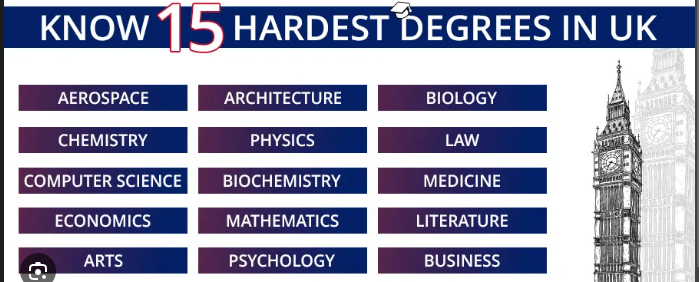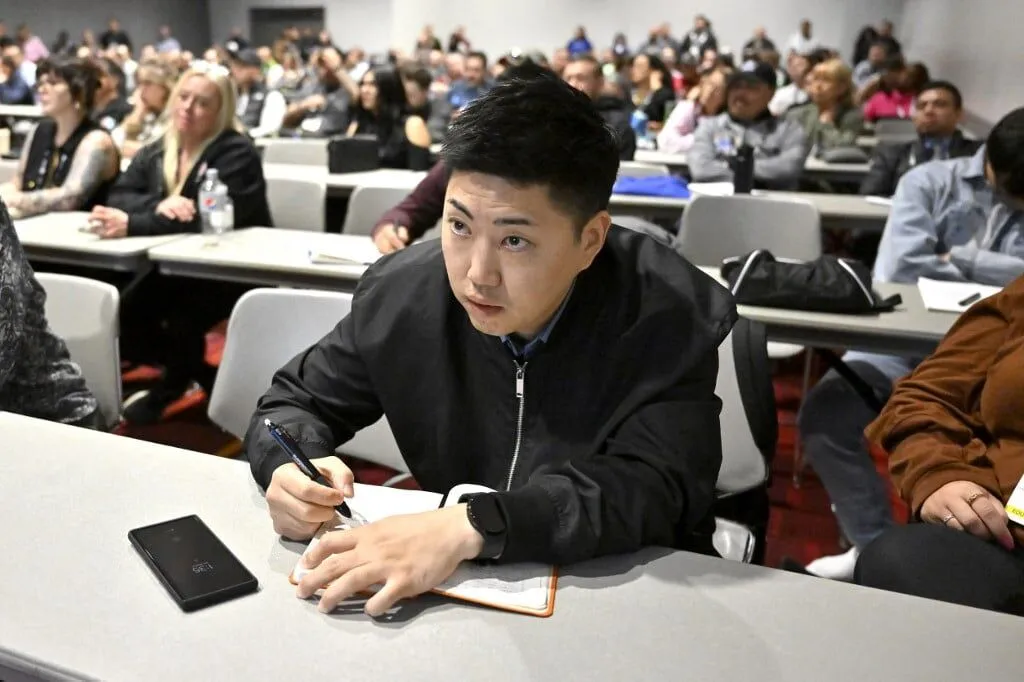Determining the hardest degree in the world is subjective, as it varies based on individual strengths and interests. However, fields like Medicine, Aerospace Engineering, and Astrophysics are often considered among the toughest.
Medicine requires extensive theoretical knowledge, practical skills, and long study durations. Aerospace Engineering demands proficiency in complex mathematics and design principles for aircraft and spacecraft.
Astrophysics combines advanced physics and astronomy, requiring deep analytical skills. Other challenging degrees include Law, Pharmacy, and Architecture, each with its own rigorous coursework and skill sets. Ultimately, the hardest degree depends on personal aptitude and dedication to excel in the chosen field.
Which Factors Determine a Course’s Difficulty?

Determining the difficulty of a course involves considering various factors that collectively contribute to its rigor and demands. Below are key factors that
High Drop-out Rates
Courses with high drop-out rates often indicate significant difficulty levels. When students struggle to cope with the intensive coursework and pace of learning, they may opt to leave the program. Reasons for dropping out commonly include the perceived difficulty of the course compared to alternatives.
Intensive Coursework
Courses with extensive syllabi that require students to dedicate considerable time, often exceeding 10 hours a day, can be particularly challenging. Specializations within these courses may further increase their difficulty, demanding additional focus and effort.
Teaching Style and Academic Expectations
The teaching style employed by universities, along with grading criteria and academic expectations, can impact students’ comprehension and performance. Variances in course materials and assessment methods also influence difficulty levels.
Continuous Exams and Assessments
Some courses necessitate frequent assessments due to their expansive content, placing strain on students. The perpetual cycle of preparation and examination can adversely affect mental well-being. Professional courses such as LLM and CA exemplify this challenging structure, with escalating difficulty levels at each stage.
Admission Exams
Entrance tests for certain courses are intentionally rigorous to admit only the most qualified applicants. The complexity of these exams serves to filter out candidates, given the high volume of applications received by universities.
University Reputation and Course Structure
Institutions with stringent education systems and comprehensive course structures may offer courses perceived as more challenging. Variations in course delivery, university rankings, and popularity among students contribute to the overall difficulty.
Course Requirements and Prior Knowledge
The difficulty of a course may be amplified if students lack prerequisite knowledge or experience. Careful consideration should be given to selecting courses aligned with previous academic preparation.
Additionally, courses such as medical MS and MD programs may entail specific licensing requirements, potentially necessitating restarting education in a new country.
How to Get into the World’s Hardest Courses?

Securing admission to the world’s most challenging courses demands strategic planning and meticulous preparation. While daunting, it’s certainly achievable with the right approach. Here’s a comprehensive guide on how to navigate the application process for these elite programs:
Research Your Options
Before applying, conduct thorough research on the programs aligning with your academic and career aspirations. Consider factors such as program reputation, faculty expertise, curriculum, and facilities to ensure compatibility with your goals.
Prepare Application Materials
Carefully compile all required application materials. These typically include a well-crafted resume or CV, standardized test scores (e.g., GRE, MCAT, LSAT), essays, letters of recommendation, and official transcripts. Adhere strictly to the application guidelines and submit your materials before the specified deadline.
Standardized Test Preparation
Recognize the importance of standardized tests in the admissions process for rigorous courses.
Dedicate ample time to prepare for exams like the GRE, MCAT, or LSAT by utilizing practice tests and study resources. You may also consider enrolling in test preparation courses or hiring tutors for personalized assistance.
Acquire Real-World Experience
Many elite programs value applicants with substantial real-world experience in their chosen field.
Seek out internships, research opportunities, or volunteer positions relevant to your area of study to gain hands-on training and distinguish yourself from other candidates. Practical experience can significantly bolster the strength of your application.
Seek Guidance and Support
As you navigate the application process, consider seeking guidance from educational consultants or mentors who can provide expert advice and support.
Educational consulting firms specialize in helping applicants optimize their applications, navigate admissions procedures, and maximize their chances of acceptance. They do this through personalized assistance and strategic guidance.
Top 20 Most Difficult Degree in the World
| Course | Field |
| Medicine | Healthcare |
| Engineering | STEM |
| Law | Legal Studies |
| Neuroscience | Neuroscience |
| Quantum Physics | Physics |
| Pharmacy | Healthcare |
| Chemistry | Science |
| Chartered Accountancy | Finance & Accounting |
| Architecture | Design & Construction |
| Psychology | Behavioral Science |
| Data Science | Computer Science |
| Quantum Mechanics | Physics |
| Mathematics | Mathematics |
| Astronomy | Science |
| Radiology | Healthcare |
| Oceanography | Earth & Environmental Science |
| Environmental Studies | Earth & Environmental Science |
| Zoology | Life Sciences |
| Economy & Financial Studies | Economics & Finance |
Contenders for the hardest degree

Based on the detailed information provided, the contenders for the hardest degree programs include:
Aerospace Engineering
Aerospace engineering is a dynamic field that encompasses the intricate study of aircraft and spacecraft design, manufacturing, and testing. It spans aeronautical, astronautical, and avionics engineering, presenting students with a range of challenges. Mastery of advanced mathematics, including calculus, trigonometry, and algebra, along with proficiency in differential equations and linear algebra, is essential for in-depth analysis.
Additionally, students must hone their design skills to craft complex aerospace systems, such as aerodynamics and propulsion systems. Critical thinking plays a crucial role, enabling students to tackle challenges in flight mechanics, structural analysis, and system optimization.
Admission into aerospace engineering programs often requires stellar grades in mathematics and science subjects at the secondary level. Top institutions may impose additional entrance exams or interviews to assess candidates’ engineering aptitude.
Law
Law encompasses the intricate study of legal principles, legislation, and case law, with applications spanning civil, criminal, and corporate contexts. However, aspiring lawyers face several key challenges throughout their journey.
Firstly, extensive reading and analysis are essential, as students delve into vast legal texts, cases, statutes, and precedents to comprehend complex legal issues fully.
Moreover, honing analytical skills is crucial, requiring critical thinking and logical reasoning to dissect legal problems and apply principles to real-world scenarios effectively. The legal career path is fiercely competitive, requiring rigorous training, exams, and intense competition for sought-after training contracts or pupillages.
Additionally, entry into law programs typically demands strong academic performance, especially in subjects like English, history, and social sciences. Often, this is accompanied by admissions tests or interviews at some universities.
Chartered Accountancy
Chartered accountancy encompasses the study of accounting principles, financial management, taxation, and auditing, leading to professional accreditation by recognized bodies like the Association of Chartered Certified Accountants (ACCA).
However, aspiring chartered accountants encounter several key challenges along their journey. Firstly, mathematical proficiency is vital for tasks such as financial analysis and taxation calculations.
Additionally, strong analytical and problem-solving skills are required to analyze financial data and offer strategic recommendations. Understanding complex regulatory frameworks, including tax regulations and accounting standards, is also crucial for effective practice.
Admission into chartered accountancy programs typically demands strong academic performance in mathematics, economics, and business-related subjects at the secondary level. This requirement varies based on the accrediting body and institution.
Architecture
Architecture demands a rigorous commitment akin to medical degrees, blending creative vision with technical precision. Mathematical proficiency is crucial, requiring a deep understanding of geometry, trigonometry, and algebra for accurate planning.
The journey to becoming a licensed architect is lengthy, involving practical work experience, additional coursework, and a final qualifying exam. Architecture students face substantial workloads, dedicating countless hours to building models and drafting designs. Balancing creative aspirations with practical constraints can be emotionally taxing, as there are no perfect designs, only continuous refinement.
Despite the challenges, the pursuit of architecture offers the opportunity to shape the built environment and leave a lasting impact on society.
Chemistry
Chemistry offers a challenging academic journey due to its vast scope and intricate nature. It covers diverse topics like organic chemistry, inorganic chemistry, and physical chemistry, demanding deep understanding and memorization of compounds, reactions, and theories.
Moreover, chemistry intertwines with mathematics and physics, necessitating proficiency in these subjects for grasping complex concepts. Practical learning is a key aspect, with students spending considerable time in laboratories conducting experiments, writing reports, and applying theoretical knowledge to real-world situations. Through hands-on experiences and theoretical understanding, chemistry students develop essential skills for scientific inquiry and problem-solving.
Medicine
Becoming a doctor through medical school is tough stuff. It’s super competitive to get in, with only a small percentage of applicants cutting. Once you’re in, get ready for a long road ahead. It starts with a five-year medical degree, followed by more training and specialization that can take over a decade.
And the amount of stuff you need to learn? It’s huge! From the basics of science to hands-on patient care, there’s a ton to know. It’s all because doctors have big responsibilities—they’re in charge of people’s lives, after all.
Pharmacy
Pharmacy is renowned for its challenging curriculum and rigorous training requirements, placing it among the most demanding degrees. It integrates various scientific disciplines such as chemistry, biology, and human anatomy to understand how medicines interact with the body.
Moreover, practical training, including clinical placements and skills workshops, enhances students’ clinical competencies for professional practice. Post-graduation, aspiring pharmacists must complete additional training, including pre-registration and passing qualifying examinations. Pharmacy demands critical thinking skills to apply scientific principles in real-world scenarios, alongside significant time investment in lectures and clinical placements.
Staying updated on evolving regulations ensures safe and effective pharmaceutical practice, highlighting the importance of regulatory knowledge in this dynamic field.
Psychology
Psychology is a dynamic field that encompasses a wide range of disciplines, including biology, sociology, philosophy, and anthropology. Students pursuing psychology navigate through various specializations like social psychology and neuroscience.
Admission to esteemed institutions such as the University of Cambridge requires exceptional academic performance, often accompanied by written tests. The coursework involves lectures, classes, and research projects, culminating in a substantial research paper.
Practical application of psychological principles is vital, with graduates needing strong communication skills to translate research findings into real-world interventions.
Research skills are honed through experimentation, data collection, and analysis. Clinical training offers hands-on experience in therapeutic settings, fostering counseling skills and cultural sensitivity.
Statistics
Statistics demands a blend of mathematical proficiency, communication skills, and practical experience, making it academically rigorous yet rewarding. Proficiency in calculus, linear algebra, probability theory, and computer science is essential, coupled with strong analytical and problem-solving abilities for handling complex datasets.
Effective communication allows statisticians to convey insights to diverse audiences, enhancing employability across various career paths like data analytics and financial risk analysis.
Practical components such as data analysis projects provide hands-on experience in data manipulation and interpretation. Critical thinking is paramount, requiring evaluative skills to ensure accurate conclusions drawn from data while considering validity and limitations.
Despite its challenges, statistics offers abundant opportunities for growth and impact in today’s data-driven world.
Nursing

Nursing education encompasses a broad spectrum of responsibilities, demanding students to cultivate comprehensive skills and knowledge for effective patient care. With a rigorous curriculum, nursing programs blend practical skills with theoretical understanding, covering diverse topics such as equity, bioscience, and health determinants.
Admission to esteemed institutions like King’s College London necessitates strong academic aptitude in subjects like biology, chemistry, physics, and psychology.
Nursing students must demonstrate both independent and collaborative aptitudes, navigating various disciplines with agility and problem-solving prowess. Practical placements and lab experiences offer invaluable hands-on training in clinical settings, enhancing skills and confidence.
Post-graduation, aspiring nurses undergo further training and examinations to become registered professionals, highlighting dedication to professional development and patient care competency.
Physics
Physics is renowned for its mathematical rigor, demanding mastery of complex principles, formulas, and calculations, which renders it one of the most challenging degrees.
Beyond rote memorization, students must grasp the conceptual underpinnings and practical applications of physics concepts. Problem-solving skills take precedence, as students tackle intricate problems with logical thinking and analytical reasoning, prioritizing understanding over memorization.
The field’s breadth spans from black holes to electromagnetic waves, requiring students to bridge theory with practical applications in diverse contexts. Moreover, as a dynamic discipline, physics constantly evolves with ongoing research and discoveries. This underscores the importance of lifelong learning and intellectual curiosity in this ever-expanding field.
Astrophysics
It is a captivating interdisciplinary field that merges physics, astronomy, and mathematics to unravel the mysteries beyond our solar system. Students embark on a journey through complex subjects like quantum mechanics, relativity, cosmology, and thermodynamics, delving into the vastness and intricacies of the universe.
Proficiency in advanced mathematics, including multivariate calculus, is paramount for analyzing astronomical phenomena and modeling intricate systems. Admission to esteemed programs like St Andrews hinges on a strong academic background in physics and mathematics at the secondary level.
However, beyond academic prowess, success in astrophysics demands genuine passion and dedication, as students grapple with challenging concepts and pursue groundbreaking research questions.
Biomedical Engineering
Biomedical engineering stands out for its interdisciplinary nature, seamlessly integrating biology, chemistry, physics, computer science, and medical science. This fusion necessitates students to bridge multiple disciplines, fostering a comprehensive understanding of diverse fields.
Moreover, the field emphasizes innovation and problem-solving, driving biomedical engineers to develop novel technologies and treatments for enhancing human health.
Admission to prestigious programs like Imperial College London requires high academic proficiency in mathematics and science subjects, reflecting the rigorous educational standards.
Furthermore, students have the opportunity to specialize in various areas such as bioengineering, electrical bioengineering, mechanical bioengineering, or computational bioengineering. This aligns with their interests and career aspirations.
The real-world applications of biomedical engineering projects underscore the significance of practical skills and scientific comprehension. This emphasizes the field’s vital role in advancing healthcare and medical practice.
Astronomy
Exploring the universe in astronomy involves testing ideas and analyzing data to learn more about space. Math skills like solving equations and using algebra are crucial for understanding astronomical patterns. Astronomy is always changing, so there’s always something new to discover and study. To get into top astronomy programs, you need to do well in physics, math, and similar subjects in school.
But most importantly, you need a deep love for exploring the mysteries of the cosmos. You also need a drive to ask and answer big scientific questions through observation and analysis.
Dentistry
Dentistry requires both book smarts and hands-on skills to help people with their teeth. It’s tough to get into dental school since there are limited spots and they want the best students.
In dental school, you learn how to use what you’ve learned in real-life situations with patients. You study things like fixing teeth and gum problems. It’s important to be good at both understanding medical stuff and using your hands. Dentistry isn’t just about teeth; it’s about making sure people stay healthy and happy with their smiles.
Final Words
The hardest degree varies from person to person, depending on individual strengths and interests. Fields like Medicine, Aerospace Engineering, and Astrophysics are often considered challenging due to their demanding coursework and specialized skills.
However, degrees such as Law, Pharmacy, and Architecture also present significant challenges.
Ultimately, success in any degree program relies on dedication, perseverance, and a genuine passion for the subject. Regardless of the chosen field, achieving academic excellence requires hard work, determination, and a commitment to continuous learning and growth.
